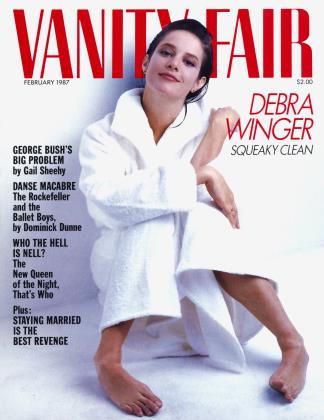Sign In to Your Account
Subscribers have complete access to the archive.
Sign In Not a Subscriber?Join NowGeorge Bush never fights back, but he'll take any amount of flak for his president. GAIL SHEEHY looks deep into the Republican front-runner's character to find out why he'd rather risk political damage than the loss of Reagan's approval
February 1987 Gail Sheehy Philip BurkeGeorge Bush never fights back, but he'll take any amount of flak for his president. GAIL SHEEHY looks deep into the Republican front-runner's character to find out why he'd rather risk political damage than the loss of Reagan's approval
February 1987 Gail Sheehy Philip Burke View Full Issue
View Full Issue






Subscribers have complete access to the archive.
Sign In Not a Subscriber?Join Now